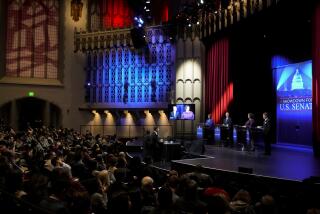Congress’ Leaders Spar in TV Debate
WASHINGTON — Defending their records in a rare formal debate only weeks before critical House and Senate elections, Republican congressional leaders on Sunday touted the 104th Congress’ “common-sense” reforms while Democrats called the GOP’s retreat from past rhetoric an “election year conversion.”
“We have delivered for the American people, and we will continue to do that,” said Senate Majority Leader Trent Lott (R-Miss.), citing immigration, welfare reform and health insurance bills produced by the first Republican-controlled Congress in 40 years.
But House Minority Leader Richard A. Gephardt (D-Mo.) hammered at the more controversial aspects of Republican rule, including the government shutdowns during last year’s budget fight and the unsuccessful GOP drive to cut taxes and slow the growth of Medicare.
“Two years ago the American people voted for change, but I don’t think they got the change they were looking for,” Gephardt said.
The nationally televised debate between Lott, Gephardt, House Speaker Newt Gingrich (R-Ga.) and Senate Minority Leader Tom Daschle (D-S.D.) provided a precis of the kinds of arguments that congressional candidates are making this fall in their collective fight for control of Congress.
The leaders faced off in Williamsburg, Va., in a forum sponsored by the Public Broadcasting System and moderated by Jim Lehrer. PBS also organized dozens of debates around the country between individual House and Senate candidates, which PBS affiliates aired before and after the leadership debate.
Although debates among presidential candidates are common, the congressional leaders’ matchup was unprecedented, according to PBS organizers.
The broadcast underscored how much this year’s House and Senate elections are viewed as a referendum on the GOP Congress, rather than as an amalgam of hundreds of state and local contests.
The debate was supposed to be about “the future of Congress,” but the four leaders spent most of their time arguing about the past two years of Republican control. Democrats used much of their time to remind voters of flash-points in those two years that Republicans would rather they forget, such as the government shutdowns during last winter’s budget battles.
If Democrats take control of Congress in 1996, Gephardt said, “we will never, ever shut the government down.”
Gingrich acknowledged that Republicans were chastened by the experience. “We did learn a lot over that,” he said.
Democrats complained that the GOP pursued deep cuts in federal spending but Lott noted that the budget bill expected to win final congressional approval today will increase spending. “I agree we should have more funding for education. Why wait till next year? We’re doing it this year.’
“That’s an election year conversion,” responded Daschle. “My concern is what you’re going to do next year.”
More to Read
Get the L.A. Times Politics newsletter
Deeply reported insights into legislation, politics and policy from Sacramento, Washington and beyond. In your inbox three times per week.
You may occasionally receive promotional content from the Los Angeles Times.











